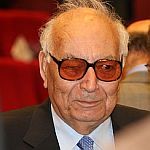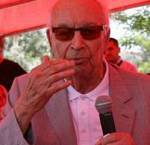Turkey Says Adieu to Yaşar Kemal

Yaşar Kemal, one of the greatest writers in literature in Turkish, died in Istanbul due to respiratory issues and irregular heart on Saturday afternoon. He was 92.
Priorly on January 14 he was hospitalized at Istanbul School of Medicine Hospital.

Following the funeral ceremony at Istanbul’s Teşvikiye Mosque this afternoon, on the other hand, Yaşar Kemal was buried in Zincirlikuyu cemetery.
The funeral was attended by the following notable people: Ertuğrul Kürkçü (Peoples' Democratic Party), Orhan Miroğlu, Osman Kavala, Tuncay Özkan, Muhsin Kızılkaya, Ahmet Güneştekin, Hasan Cemal, Ufuk Uras, Cengiz Çandar, Tarık Akan, Rutkay Aziz, Lami Özgen, Alper Taş, Mustafa Denizli, Akın Birdal, Süleyman Çelebi, Selahattin Demirtaş (Peoples' Democratic Party), Şeyhmus Diken, Türkiye Syriac Catholic Interim Patriarch Yusuf Sağ, Halit Kıvanç, Aydın Engin, Orhan Pamuk, 11th President Abdullah Gül, Orhan Gencebay, Republican People's Party Chairman Kemal Kılıçdaroğlu, Parliament Chairman Cemil Çiçek, Istanbul mayor Kadir Topbaş, Hasip Kaplan, Mahmut Tanal, Levent Gök, Levent Tüzel, Umut Oran, Sırrı Sakık, Zeynep Tanbay, İpek Çalışlar.
A commemoration gathering will also be held this afternoon at 3:30pm local time in Lütfi Kırdar Congress Hall under the title “A farewell gathering to Yaşar Kemal with his own words”. The ceremony will be aired free by Turkey’s Anatolia Agency.
Notable condolences
Following the death of Yaşar Kemal, Turkey’s top bureaucrats, major media associations former presidents and political organizations.
President Recep Tayyip Erdoğan also released a message, sending his condolences. Other message-releasing notable people and organization included Writers’ Union of Turkey (TYS), Media Council, Jounalists’ Union of Turkey, 11th President Abdullah Gül, 9th President Süleyman Demirel, Democratic Socirty Congress (DTK), EMEP, Peoples’ Democratic Party (HDP), Republican People’s Party Chairman Kemal Kılıçdaroğlu, Parliament President Cemil Çiçek, Prime Minister Ahmet Davutoğlu, Nationalist Movement Party (MHP) Chairman Devlet Bahçeli.
Author Yaşar Kemal
Kemal published his first book Ağıtlar ("Ballads") in 1943, which was a compilation of folkloric themes. This book brought to light many long forgotten rhymes and ballads. He had begun to collect these ballads at the age of 16. His first stories Bebek ("The Baby"), Dükkancı ("The Shopkeeper") and Memet ile Memet ("Memet and Memet") were published in 1950. He penned his first tale Pis Hikaye ("The Dirty Story") in 1944, while he was serving in the military, in Kayseri. Then he published his book of short stories Sarı Sıcak ("Yellow Heat") in 1952. The initial point of his works was the toil of the people of the Çukurova plains and he based the themes of his writings on the lives and sufferings of these people. Kemal used the legends and stories of Anatolia extensively as the basis for his works.
He received international acclaim with the publication of Memed, My Hawk (Turkish: İnce Memed) in 1955. In İnce Memed, Kemal criticizes the fabric of the society through a legendary hero, a protagonist, who flees to the mountains as a result of the oppression of the Aghas. One of the most famous writers in Turkey, Kemal was noted for his command of the language and lyrical description of bucolic Turkish life. He was awarded 19 literary prizes during his lifetime and nominated for the Nobel Prize in Literature in 1973.
His 1955 novel Teneke was adapted into a theatrical play, which was staged for almost one year in Gothenburg, Sweden, in the country where he lived for about two years in the late 1970s. Italian composer Fabio Vacchi adapted the same novel with the original title into an opera of three acts, which premiered at the Teatro alla Scala in Milano, Italy in 2007.
Journalist Yaşar Kemal
Started his journalism career in 1951 in Cumhuriyet newspaper, his interview “7 Days in the Biggest Wranch in the World” was acclaimed by Journalists’ Society of Turkey.
In the 1950’s he wrote columns to Cumhuriyet twice a week under the titles “This Sunday” and “This Wednesday”. After Cumhuriyet, he wrote columns for Yön, Ant and Yeni Halkçı.
He was also elected as founding president for Journalists Union of Turkey and Pen Writer Association.
In 1998, he received Bordeaux Book Fair’s "Ecureuil" award. In 2000, he was once more nominated for Nobel Prize in literature.
Several times he was prosecuted, tried and convicted for his writings. (BM)
* This article is a compilation of several bianet articles and outside sources.





